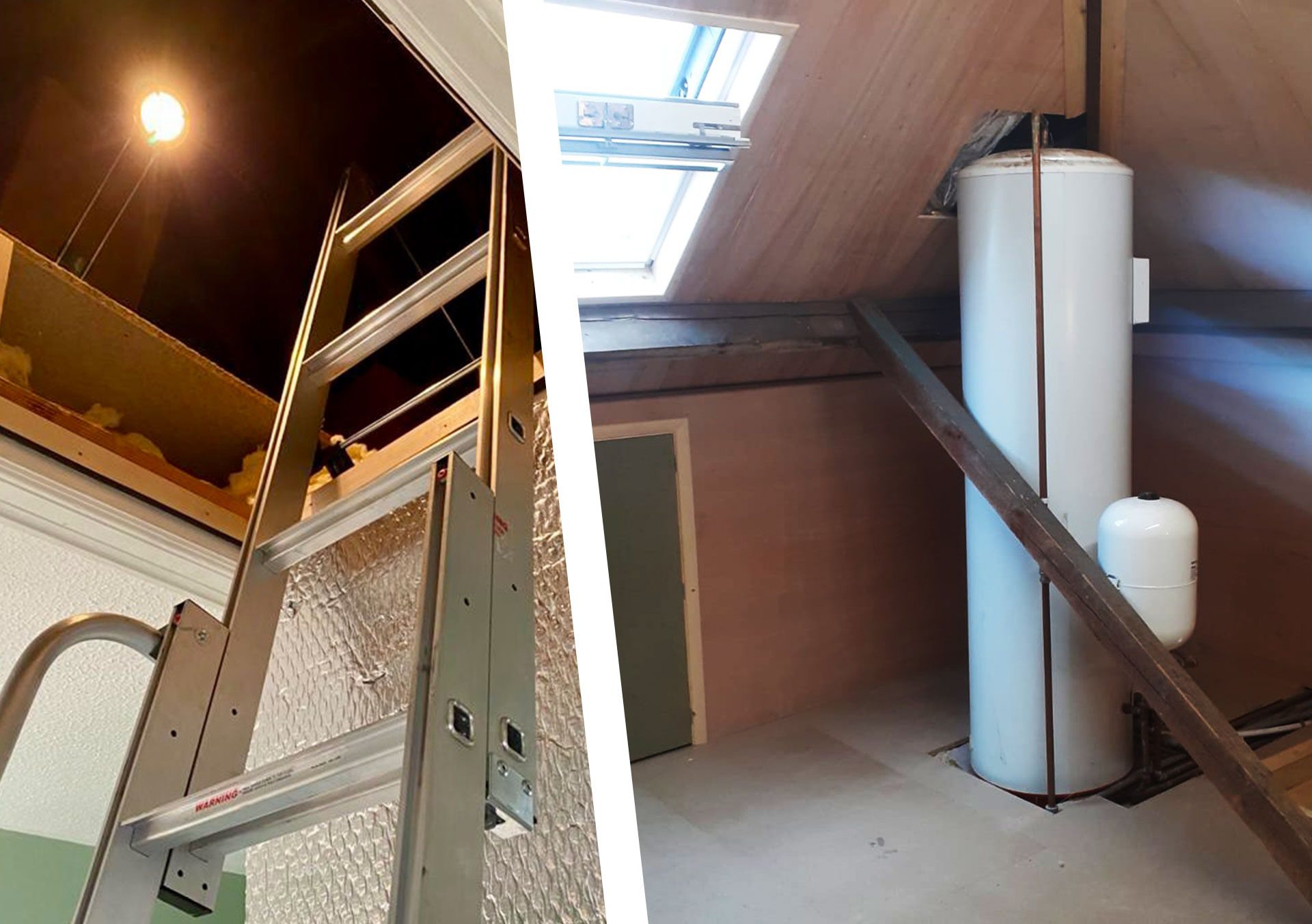Commonly, boilers are installed within a kitchen, hallway or inside an airing cupboard on the ground floor of a property. However, the boiler unit can be unsightly and take up space. And therefore homeowners may wish to investigate if the boiler can be moved into a loft, completely out of sight.
In this guide, we will explore the advantages and disadvantages of having a boiler installed in the loft. We’ll also cover the regulations involved with this type of boiler installation, as well as discussing the typical costs involved.
Thinking of turning your loft into a practical storage space? We can help!
Find out more about our Professional Loft Services or…
Book a Free Survey TodayAre there regulations to adhere to when installing a boiler in a loft?
Yes, there are a few regulations that must be met in order to safely and legally install a boiler within the loft. The main ones are as follows:
- Plumbing of utilities and electricity – The appropriate plumbing will be required in order to install the boiler in a loft. The services required may vary depending on the type of boiler. Commonly gas, water and electric terminals will be required to be installed into the loft ready to fit the boiler.
- Isolation points – There is a requirement for each of the utilities to have isolation points so that the supply can be easily turned off. This is to enable safe conditions for maintenance to be undertaken. Such points are also used to isolate the boiler encase of an emergency.
- Ventilation – In addition to the utilities required, a vent will also be needed. This is in order to safely remove the dangerous combustion gases from the property. And the vent must be installed on an outside wall. Therefore, this must be explored before making plans to install a boiler in the loft.
- Access – There are regulations regarding the necessary access to the boiler. This is so that heating engineers can safely complete servicing and maintenance procedures. Therefore, there must be suitable boarded flooring space within the loft to enable safe working. Plus a ladder to access the loft with a handrail is essential, as well as appropriate lighting.
What are the advantages of moving or installing a new boiler into the loft?
There are several advantages of moving a boiler from the main living areas of a property into the loft. Or to have a new installation located in a loft space. These are as follows:
- To Save Space – Boilers can take up valuable living space especially if sizeable tanks are also in situ. Space can be saved if a new boiler installation can be safely installed in the loft. Should a change in a boiler type be possible, the tanks possibly could be decommissioned and removed too.
- Improves Aesthetics – Boilers and their associated pipework can be unsightly. Therefore, relocating a boiler into the loft can improve the aesthetics of living areas, providing a more minimalistic style.
- Decreasing noise levels – Boilers can create a humming noise when in operation. Plus there can be noises of running water through the system. Thus, by relocating the boiler, the likelihood of hearing the operational sounds would be reduced.
What are the disadvantages?
There are a number of disadvantages that should be considered before opting to move a boiler into a loft. These are as follows:
- Potential temperature damage to the boiler – The main risk that would need to be considered is the extreme temperature changes. These often occur within loft spaces and can impact a boiler and the internal parts causing potential damage. One solution to this is getting the underside of your roof insulated. Doing this provides a more consistant temperature in the loft.
- Inconvenience of checking the boiler – Regular checks are often required to monitor the performance of a boiler. These may include pressure checks. To undertake such checks once the boiler has been relocated would involve being able to easily access the loft. This is often less convenient compared with having the boiler in a living area. In addition, if the boiler was displaying an error message or had sprung a leak for example, the warning signs may be missed when the boiler is out of sight.
- Boiler Performance – By locating a boiler in the loft, it is likely that the water outlets such as kitchen taps will be a further distance away. This can cause delays in hot water reaching the taps. As EnergyGuide states “The performance will largely be affected by the power output of the installed boiler and the property’s water pressure however the distance between the outlets and boiler may also be a factor”.
- Set-up Costs – The set-up costs will vary depending on the type of boiler chosen. It is likely that increased pipework will be required. This will increase the costs of a loft installation in comparison with one on the ground floor.
Costs of Moving a Boiler into the Loft
As briefly mentioned above, the costs of installing a boiler system will vary depending on a range of factors including:
- The type of boiler and heating system, including any requirement for a water tank
- The property layout and current pipework – Changes to the pipework from the current boiler location to the loft will involve additional costs. It’s important that these be factored in to the cost as further meters of pipework will increase the costs. Only with a specific quote from a Gas Safety registered heating engineer can you be sure of the final cost.
- The requirement to install utilities and their isolation points into the loft
- As discussed, there are a number of factors that will impact the cost of moving a boiler into a loft space. Therefore, an exact price cannot be provided for every scenario. However, as a rough estimate, the cost of moving a boiler is often between £250 and £500.
Due to these costs, it is often not recommended that a current boiler is relocated. Rather, when the time comes for a new boiler, this is when a loft installation may be considered.
Summary
In this post, we have discussed why a homeowner or landlord may seek to install a boiler in the loft of a property. We’ve gone over the space-saving benefits, however, we have also explored the risks of relocating a boiler into a loft. Such as damage occurring to the boiler from the extreme temperature changes. Or the warning signs of a malfunction being missed while the unit is out of sight.
Should you require any further advice in relation to relocating your boiler into a loft, or to obtain a tailored quote for the works involved, please contact a Gas Safe registered heating engineer. And as ever, if you have any questions about your loft, please get in touch.
Need help clearing out your loft? We can help!
Read more about our Loft Removal & Disposal Service or…
Book a Free Survey TodayWas this post useful? Here are some other’s you might like...






